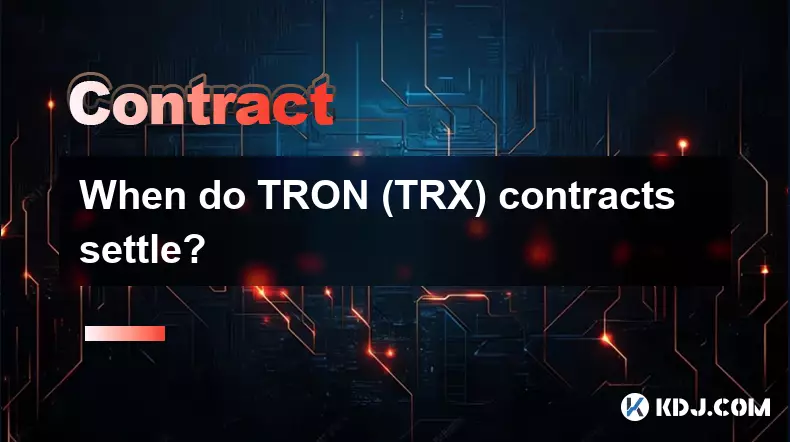-
 bitcoin
bitcoin $87959.907984 USD
1.34% -
 ethereum
ethereum $2920.497338 USD
3.04% -
 tether
tether $0.999775 USD
0.00% -
 xrp
xrp $2.237324 USD
8.12% -
 bnb
bnb $860.243768 USD
0.90% -
 solana
solana $138.089498 USD
5.43% -
 usd-coin
usd-coin $0.999807 USD
0.01% -
 tron
tron $0.272801 USD
-1.53% -
 dogecoin
dogecoin $0.150904 USD
2.96% -
 cardano
cardano $0.421635 USD
1.97% -
 hyperliquid
hyperliquid $32.152445 USD
2.23% -
 bitcoin-cash
bitcoin-cash $533.301069 USD
-1.94% -
 chainlink
chainlink $12.953417 USD
2.68% -
 unus-sed-leo
unus-sed-leo $9.535951 USD
0.73% -
 zcash
zcash $521.483386 USD
-2.87%
When do TRON (TRX) contracts settle?
TRON's DPoS consensus enables near-instant transaction finality, with settlements typically confirmed in 3–6 seconds via 27 Super Representatives.
Sep 28, 2025 at 07:36 am

Understanding TRON (TRX) Network Settlement Mechanics
1. Transactions on the TRON blockchain finalize almost instantly due to its Delegated Proof-of-Stake (DPoS) consensus mechanism. Unlike proof-of-work chains that require multiple confirmations, TRON relies on 27 elected Super Representatives to validate blocks every three seconds. This structure enables rapid settlement times, making it highly efficient for decentralized applications and token transfers.
2. Once a transaction is included in a block, it is considered settled with high confidence after just one confirmation. The deterministic finality of the network ensures that rollback scenarios are extremely rare under normal operating conditions. Users typically see their TRX or smart contract interactions reflected within seconds of submission.
3. Smart contract execution follows the same timeline as standard transactions. When a user interacts with a decentralized finance (DeFi) protocol or NFT marketplace built on TRON, the outcome of that interaction—such as a swap, mint, or bid—is confirmed within the next available block. Gas fees, paid in SUN (1 TRX = 1,000,000 SUN), are deducted at the time of execution.
4. For exchanges and custodial platforms, withdrawal processing may add additional delays beyond blockchain settlement. While the TRON network itself confirms transactions rapidly, third-party services might impose internal review periods or batch withdrawals, which can extend the total wait time experienced by end users.
Block Finality and Confirmation Speed
1. Each block on the TRON network is produced every 3 seconds by a rotating Super Representative. This predictable block time allows developers and users to anticipate when a transaction will be included and finalized.
2. Finality is achieved quickly because each new block strengthens the validity of the previous one. In practice, most services consider a transaction irreversible after 1–2 block confirmations, which equates to less than 10 seconds from broadcast.
3. The network's architecture minimizes fork occurrences, reducing uncertainty around settlement. Even during peak usage, the consensus algorithm maintains tight coordination among validating nodes, ensuring consistent block propagation.
4. High throughput capacity—capable of handling over 2,000 transactions per second—further supports fast settlement without congestion-related delays commonly seen on other blockchains.
Smart Contract Execution Timing
1. When a user triggers a smart contract function, such as depositing funds into a liquidity pool, the operation is processed in the next available block. There is no separate 'settlement period' outside of standard block inclusion.
2. Developers can estimate execution timing with precision due to fixed block intervals. This predictability benefits automated systems like arbitrage bots or price oracles that depend on timely data updates.
3. Internal contract logic, such as conditional transfers or vesting schedules, operates based on block timestamps. These time-based functions align directly with the network’s settlement rhythm, ensuring reliable behavior across all participating nodes.
4. Failed transactions consume resources but do not alter state. Even unsuccessful contract calls are settled in the sense that they are permanently recorded on-chain, with associated energy or bandwidth costs applied to the sender.
Frequently Asked Questions
How long does it take for a TRX transfer to settle?Most TRX transfers settle within 3 to 6 seconds, depending on network load and when the transaction is picked up by a Super Representative.
Do TRON smart contracts require multiple confirmations?No. A single confirmation is generally sufficient for smart contract interactions due to the network’s strong finality guarantees and low reorganization risk.
Can a settled TRON transaction be reversed?Under normal circumstances, reversal is practically impossible once a transaction is written to the blockchain. Only in extreme cases involving consensus-level attacks could this occur, which are highly unlikely given current network security.
What factors affect TRON transaction settlement speed?Settlement speed depends on resource availability (bandwidth/energy), transaction fee level, and node connectivity. Properly configured wallets with adequate resources experience near-instant processing.
Disclaimer:info@kdj.com
The information provided is not trading advice. kdj.com does not assume any responsibility for any investments made based on the information provided in this article. Cryptocurrencies are highly volatile and it is highly recommended that you invest with caution after thorough research!
If you believe that the content used on this website infringes your copyright, please contact us immediately (info@kdj.com) and we will delete it promptly.
- Bitcoin’s Wild Ride: Crypto Market Faces Price Drop Amidst Extreme Fear and Macro Headwinds
- 2026-02-02 12:30:01
- Ross Stores Dominates Off-Price Retail with Brick-and-Mortar Prowess Amidst Economic Shifts
- 2026-02-02 13:20:01
- Cong, Leviste, DOE Slap: Billionaire Faces $24B Penalty Amidst Renewable Energy Promises
- 2026-02-02 13:20:01
- Bitcoin Vulnerabilities Exposed in Brutal Crypto Crash, Highlighting Market Immaturity
- 2026-02-02 13:15:02
- Unlocking Fortunes in Your Pocket: UK Coins Could Make You £1,000 Richer
- 2026-02-02 13:15:02
- APEMARS, Crypto Presale, and MrBeast Coin: Navigating the Hype and Finding True Value
- 2026-02-02 13:10:02
Related knowledge

How to close a crypto contract position manually or automatically?
Feb 01,2026 at 11:19pm
Manual Position Closure Process1. Log into the trading platform where the contract is active and navigate to the 'Positions' or 'Open Orders' tab. 2. ...

How to understand the impact of Bitcoin ETFs on crypto contracts?
Feb 01,2026 at 04:19pm
Bitcoin ETFs and Market Liquidity1. Bitcoin ETFs introduce institutional capital directly into the spot market, increasing order book depth and reduci...

How to trade DeFi contracts during the current liquidity surge?
Feb 01,2026 at 07:00am
Understanding Liquidity Dynamics in DeFi Protocols1. Liquidity surges in DeFi are often triggered by coordinated capital inflows from yield farming in...

How to use social trading to copy crypto contract experts?
Feb 02,2026 at 07:40am
Understanding Social Trading Platforms1. Social trading platforms integrate real-time market data with user interaction features, enabling traders to ...

How to trade micro-cap crypto contracts with high growth potential?
Feb 01,2026 at 02:20pm
Understanding Micro-Cap Crypto Contracts1. Micro-cap crypto contracts refer to derivative instruments tied to tokens with market capitalizations under...

How to optimize your workspace for professional crypto contract trading?
Feb 01,2026 at 08:20pm
Hardware Infrastructure Requirements1. High-frequency crypto contract trading demands ultra-low latency execution. A dedicated workstation with a mini...

How to close a crypto contract position manually or automatically?
Feb 01,2026 at 11:19pm
Manual Position Closure Process1. Log into the trading platform where the contract is active and navigate to the 'Positions' or 'Open Orders' tab. 2. ...

How to understand the impact of Bitcoin ETFs on crypto contracts?
Feb 01,2026 at 04:19pm
Bitcoin ETFs and Market Liquidity1. Bitcoin ETFs introduce institutional capital directly into the spot market, increasing order book depth and reduci...

How to trade DeFi contracts during the current liquidity surge?
Feb 01,2026 at 07:00am
Understanding Liquidity Dynamics in DeFi Protocols1. Liquidity surges in DeFi are often triggered by coordinated capital inflows from yield farming in...

How to use social trading to copy crypto contract experts?
Feb 02,2026 at 07:40am
Understanding Social Trading Platforms1. Social trading platforms integrate real-time market data with user interaction features, enabling traders to ...

How to trade micro-cap crypto contracts with high growth potential?
Feb 01,2026 at 02:20pm
Understanding Micro-Cap Crypto Contracts1. Micro-cap crypto contracts refer to derivative instruments tied to tokens with market capitalizations under...

How to optimize your workspace for professional crypto contract trading?
Feb 01,2026 at 08:20pm
Hardware Infrastructure Requirements1. High-frequency crypto contract trading demands ultra-low latency execution. A dedicated workstation with a mini...
See all articles










































































